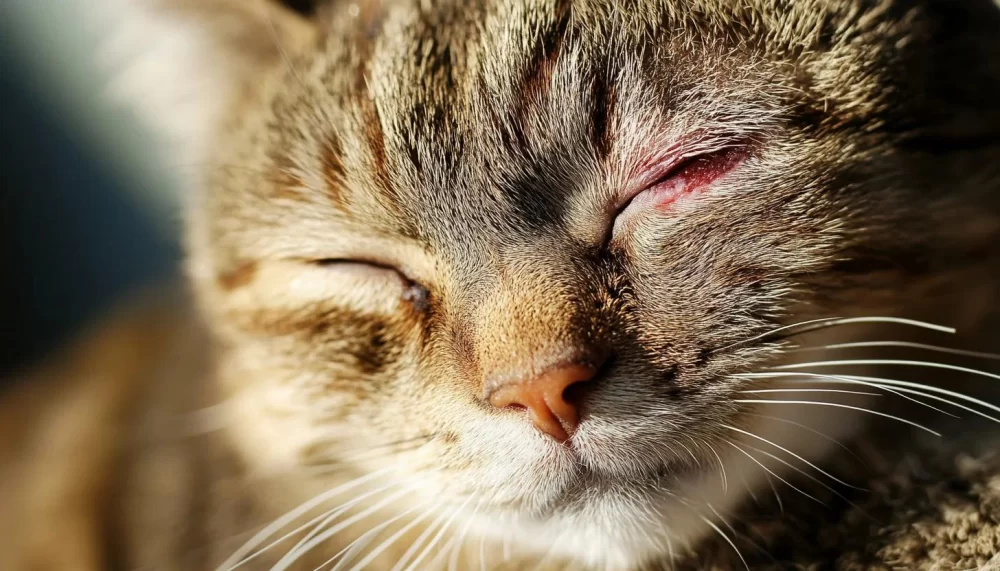How to Recognize Cat Conjunctivitis Symptoms
If you're a cat owner, there's a good chance you've noticed your cat's eyes becoming red, watery, or irritated at some point. As a cat lover myself, I’ve dealt with this concerning issue firsthand. Cat conjunctivitis, or inflammation of the conjunctiva (the pink part of the eye), is quite common, and understanding how to recognize its symptoms is the first step toward treating it effectively. Knowing what to look for can save you a lot of stress and help your furry friend feel better faster.
When my own cat, Whiskers, began squinting and rubbing her eyes incessantly, I knew something was wrong. Here’s a breakdown of what to watch for:
- Redness or swelling of the eyes: The white part of the eye might appear pink or even red. The conjunctiva becomes inflamed, which can make the eye look irritated and uncomfortable.
- Watery or discharge-filled eyes: You might notice tears constantly running down your cat’s face or a thick discharge. This discharge can vary in color, from clear to yellow or green, depending on the severity of the infection.
- Squinting or excessive blinking: Cats with conjunctivitis may squint or keep their eyes closed most of the time because of the discomfort caused by light sensitivity.
- Constant pawing at the eyes: Just like Whiskers, your cat might rub or paw at their eyes, which can make the condition worse by spreading bacteria or viruses if it's an infection.
Understanding the Causes of Conjunctivitis in Cats
Cat conjunctivitis can be caused by a variety of factors. While some cases are relatively mild and clear up on their own, others can require professional treatment. To treat it effectively, it's important to know the root cause. There are several possible culprits:
- Viral infections: The most common cause of feline conjunctivitis is a viral infection, particularly from the feline herpesvirus (FHV-1). This virus can cause both upper respiratory issues and eye infections.
- Bacterial infections: Bacteria can also cause conjunctivitis. These infections are often secondary, meaning they occur after the cat has been exposed to a virus or another irritant.
- Allergies: Just like us, cats can suffer from allergies. Pollens, dust mites, or even certain foods can trigger eye irritation.
- Environmental irritants: Things like smoke, chemicals, or even dry air can irritate your cat’s eyes and lead to conjunctivitis.
- Foreign objects: If a small object like dust or a hair gets into your cat's eye, it can cause irritation and inflammation.
What You Should Do if Your Cat Shows Signs of Conjunctivitis
If your cat has conjunctivitis, it’s essential to take action quickly to relieve their discomfort and prevent further complications. Here are the steps I took to help Whiskers when she was diagnosed with conjunctivitis:
- Schedule a Vet Visit: The first step in treating conjunctivitis is to consult a veterinarian. They can determine whether it’s viral, bacterial, or due to some other cause. My vet was able to perform tests and prescribed antiviral medication for Whiskers, as her case was caused by FHV-1.
- Eye Cleaning: Gently cleaning your cat’s eyes is crucial to remove discharge and soothe the irritation. I used a warm, damp cloth to wipe away any crust or mucus. Be sure to do this regularly, but be gentle as your cat’s eyes are sensitive.
- Medication: Depending on the cause of the infection, your vet may prescribe antibiotics or antiviral eye drops. I was prescribed antibiotic ointment to apply directly to Whiskers’ eyes. It’s important to follow the vet’s instructions carefully and ensure you apply the medication regularly.
- Keeping the Eyes Moisturized: If your cat’s eyes are dry or irritated, a vet-approved artificial tear solution can help. I used an eye lubricant to keep Whiskers’ eyes moist, which helped prevent additional irritation.
- Isolate Your Cat: To prevent the infection from spreading to other pets, it’s a good idea to keep your infected cat separated from any other animals until they’ve recovered. I did this by placing Whiskers in a quiet, comfortable room until she started to heal.
Additional Tips to Speed Up Recovery
In addition to the treatment prescribed by your vet, there are a few other things you can do to help your cat recover from conjunctivitis more quickly:
- Ensure a stress-free environment: Stress can make any illness worse, so create a calm and peaceful space for your cat. Whiskers enjoyed being in a cozy spot by the window, where she could nap in peace.
- Monitor for signs of worsening infection: Keep a close eye on your cat’s condition. If their symptoms get worse or new symptoms appear, it may indicate a more serious infection, and you should reach out to your vet immediately.
- Boost your cat's immune system: A healthy immune system can speed up recovery. Make sure your cat is eating well and staying hydrated. I also added some immune-boosting supplements to Whiskers’ diet to help her body fight off the infection.
When to Seek Immediate Vet Help
While most cases of conjunctivitis can be managed with the right treatment, there are times when you should seek immediate veterinary attention. If your cat’s condition doesn’t improve after a few days of treatment, or if you notice severe symptoms like swelling, pain, or blindness, it's important to act fast. Whiskers’ condition improved within a few days, but if she hadn’t responded, I would have taken her back to the vet for further evaluation.
Remember, early intervention is key to ensuring your cat’s eyes stay healthy and free from complications. I learned this firsthand with Whiskers, and I highly recommend that you take any signs of conjunctivitis seriously.
At Hidden Brook Veterinary, we offer expert care and advice on feline health. If you're unsure how to treat your cat’s conjunctivitis or if you need further assistance, feel free to reach out to us for professional recommendations.










